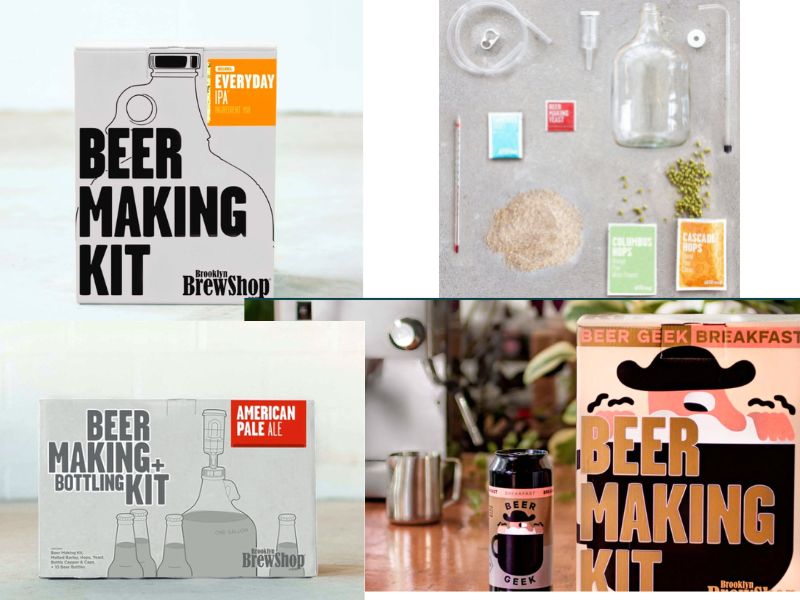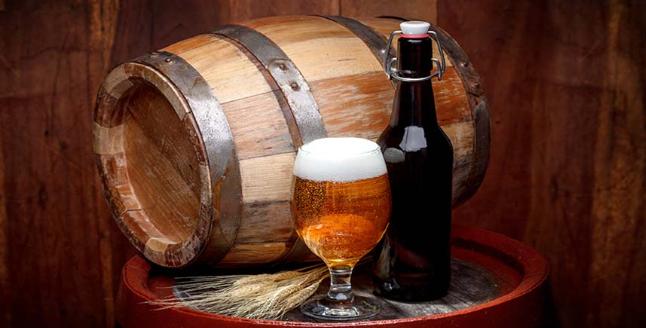Home-brewing beer is becoming increasingly popular as people become more interested in creating unique brews.
Are you a craft beer enthusiast who’s been dreaming of fermenting your beer? Have you heard that it’s possible to create a delicious craft beer in as little as 3 days?
Fermenting drinks can be a fun and rewarding experience, especially with FarmSteady’s All-in-One Kits. With these kits, ferment your beer, cider, or other drink can be fermented in as little as three days.
The kits have all the necessary instructions and ingredients to get you started quickly and easily. Plus, since fermentation occurs in a closed environment, you don’t have to worry about contamination.
Once your brew is finished, you can enjoy fresh-tasting fermented drinks without leaving your home’s comfort!

With FarmSteady’s all-in-one kits, you can experience the satisfaction of making your beer without having to fuss over-complicated recipes or processes – just set it up and sit back as fermentation does its work!
The Basics Of Brewing Beer
Brewing beer requires two main steps: mashing and fermentation. In the mashing step, grains are steeped in hot water for an hour or more, allowing enzymes to break down starches into sugars.
This sugar-rich liquid, called wort, goes through a boiling process for an hour or more before cooling down.
Once cooled off, yeast is added, which will eat the sugars from the wort and turn them into alcohol. This is when we enter the fermentation stage.
How Long Does Fermentation Take?
Typically, fermentation will take between 1-2 weeks, depending on factors such as fermentation temperature and yeast growth rate.
Using the right temperature and yeast will help reduce fermentation time, but getting those variables right is not always possible.
During this time, the yeast eats away at sugars found in wort until all that remains is carbon dioxide (which gives beer its fizz) and alcohol.
The longer you let your beer ferment, the more apparent it will become — but that doesn’t mean you have to wait weeks to enjoy your homemade brew!
CHECK OUT: Beer Brewing Calculator Review: Brewer’s Friend
Shortening Your Fermentation Time
If you’re looking for a faster way to ferment your brew without compromising the flavor or quality of your finished product, there are several ways you can speed up the process:
- Start with less grain – Using less grain reduces the complexity of flavors but also reduces fermentation time by about half (7 days instead of 14). It also makes for lighter-bodied beers that don’t require as much time conditioning before being ready for drinking!
- Use high-gravity wort – High-gravity worts contain higher sugar levels, meaning they ferment faster than those with lower gravity levels.
- Control temperature – Yeast ferments best between 64-72°F, so ensure you keep your fermentation vessels at these temperatures during the brewing process; this will help speed up fermentation significantly!
- Use fast-acting yeast – Choose a fast-acting yeast strain like US-05 or Lallemand BRY97 American West Coast Ale Yeast; these strains work quickly and efficiently while providing outstanding flavor profiles!
- Oxygenate wort – Adding oxygen helps yeast cells multiply so they can eat away at sugars faster; use an aerator before pitching yeast into cooled-off wort for best results!
- Pitch plenty of yeast – Adding more than recommended amount of yeast increases the chances that all sugars will be eaten up quickly; this is especially helpful if using high-gravity worts where more sugar needs to be consumed faster than usual! It is essential to check the degree of attenuation (by measuring gravity) to confirm that the yeast begins the completed fermentation.
- Stir often – Stirring your beer several times throughout the fermentation process helps mix ingredients evenly, which speeds up reaction time between sugar molecules being broken down by yeast cells!
What is Primary Fermentation?
Primary fermentation allows yeast to consume sugars in the wort and convert them into alcohol, carbon dioxide, and other flavorful compounds.
Primary Fermentation Primary fermentation occurs in the first vessel the wort is transferred into. Active fermentation usually takes place within 12 hours. It can take longer for liquid yeasts because of lower cell counts (more on this later), which may take up to 24 hours. Primary fermentation typically takes 3 to 5 days and is the start of converting wort to beer.
Yeast typically converts priming sugar over several days and weeks, depending on the beer brewed.
What Is Secondary Fermentation?
Secondary fermentation is transferring your beer from primary fermentation to a different fermentation vessel for further aging. This can help reduce sediment, clarify and clarify the beer, and improve flavor. Secondary fermentation can take between two weeks to several months, depending on your beer style and desired outcome.
Can You Ferment Beer In 3 Days?
Most beers require at least two weeks of fermentation before being kegged or bottle conditioning. However, some options are available if you’re looking to brew a craft beer quickly.
Yes, it is possible to ferment beer in as little as three days. Increasing the fermentation temperature and using a fast-acting yeast strain can significantly reduce fermentation time.
However, this method will produce a less flavorful beer with less complexity than if you let it ferment for the average amount of time.
Brewing An Extract Beer
Extract beer is created by combining malt extract with water. Malt extract is a concentrated form of beer wort boiled down to syrup. Adding malt extract to water and boiling it will create a simple and quick beer.
You can ferment an extract beer in as little as three days if you use an appropriate yeast strain, such as Nottingham Ale Yeast or Safale US-05. Using the correct yeast strain will allow you to produce a delicious beer in three days without sacrificing flavor.
Traditional Fermentation Process
The traditional beer-making process involves mashing malted barley, boiling it with hops, cooling the mixture, and adding yeast.
The mixture is then left to ferment for several weeks or even months before it is ready for bottling.
This process can take anywhere from two weeks to four months, depending on the type of beer and the desired flavor profile.
Quick Fermentation Process
Quick fermentation is an alternative process where brewers speed up the fermentation process by using specialized yeast strains and adjusting temperature, oxygen levels, and other factors.
With this technique, brewers can produce craft beers in as little as three days which makes it much more appealing to those wanting to get their brews ready quickly.
If you want to speed up fermentation even more, you can use a method called “kettle souring. To make lactic acid, malt sugar is fermented and inoculated with lactobacillus bacteria. This process can be done in as little as one day and produces a sour beer flavor.
However, many experienced brewers are skeptical about this method due to concerns over the lack of quality control and potential off-flavors that may result from rushing the fermentation process.
Pros & Cons
The main benefit of quick fermentation is that it allows homebrewers to get their beer ready faster without sacrificing too much on quality.
Quick fermentation also requires fewer ingredients than traditional methods, making it cheaper and more accessible for small-scale brewers who don’t have access to expensive equipment or components.
On the other hand, some argue that rushed beers might lack complexity or contain off-flavors due to not allowing enough time for flavors to develop properly.
Furthermore, quick fermentation also requires more precise temperature control, which can be difficult for novice brewers without access to temperature-controlled chambers.
CHECK OUT: Making Ginger Beer (Without Equipment!)
Conclusion
Although it’s not recommended to brew a craft beer in 3 days, it is possible with the right ingredients and equipment. Extract beers can be fermented quickly using the correct yeast strain, and kettle souring can create a delicious beer in as little as one day.
The beer fermentation process takes four to 14 days, depending on the beer being brewed and other factors such as temperature and adding yeast.
Even though the process may seem slow and tedious, the reward of a well-crafted beer will make your patience worth it.
With careful experimentation and attention to detail, you can brew a delicious batch of beer you created!
No matter what type of beer you’re looking to brew, remember that the process takes time and patience. Do your research ahead of time and have fun creating your unique brews! Cheers!
Read Next: How to Filter Beer and All in One: Electric Beer Brewing Systems





White Labs has a yeast strain that has been available to commercial breweries for some time now, which they claim can ferment a beer in as little as 3 days, but tastes just like their famous WLP001 “California Ale” strain. It’s called San Diego Super Yeast, and you may have tasted it more often than you know!